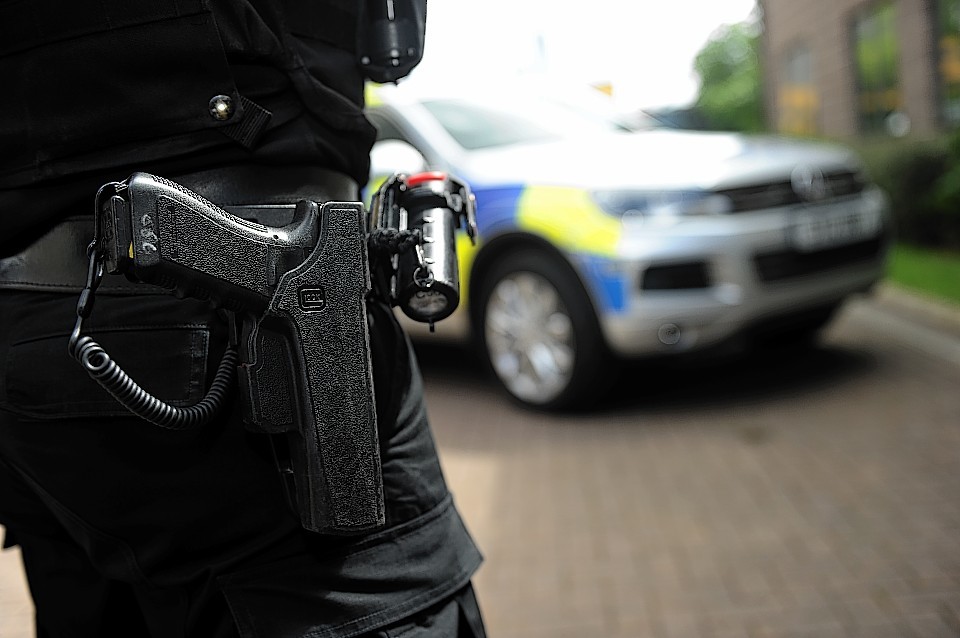Police and councillors remained at loggerheads over the force’s controversial firearms policy last night after three hours of crisis talks ended in stalemate.
The two sides remained firmly entrenched in their positions – with the majority of local authority members adamant they did not want officers routinely carrying guns on Highland streets.
One councillor said he feared the policy could be the “thin end of the wedge” and lead to all police in Scotland being armed.
After the talks in Inverness yesterday, officers carrying Glock 9mm pistols mingled with shoppers at they patrolled the city’s Eastgate area.
Earlier, they had given a demonstration to nine councillors of how they arm themselves for duty.
They took just a few minutes to perform a set of checks on their tasers and handguns.
The force has claimed that carrying the weapons in cars could delay the response to serious incidents.
But timing the procedures at police headquarters yesterday showed that if officers were already wearing their ballistics vests and tasers, arming themselves with pistols would take less than three minutes extra.
Senior officers, however, pointed out that the conditions for the demonstration were “sterile”, but also confirmed that Chief Constable Sir Stephen House could “vary” the standing authority to carry firearms.
Councillors fear the firearms policy sends out the wrong message about the Highlands – which has been described as the safest region in the country – and risks escalating minor incidents
North MP and senior UK Government minister Danny Alexander is among a number of politicians who have said they are “horrified” that officers are regularly carrying guns.
Following yesterday’s talks, which the Press and Journal was given exclusive access to, the council’s deputy leader David Alston, said: “It was useful to get confirmation that the chief constable does have power to vary the standing authority.
“He could frame it in a way that allows weapons to be kept in the secure cabinet in the vehicle.
“If it was framed in that way, we saw that the difference between that and the new system was two-and-a-half minutes to put the weapons on.”
He added: “I am still concerned that it is the chief constable and him alone that makes the decision. There are no checks and balances or scrutiny of what he is doing.
“I am concerned that he could extend the use of armed officers.”
Councillor Matthew Reiss said: “The councillors believe, by a large majority, that the current policy is at the very least questionable, both for practical reasons, and the other argument about the policing style and the message it sends out.
“The chief constable should understand that if one of the local authorities voices concerns he should listen to that.”
And Councillor Mike Finlayson said: “We’re not objecting to the fact that the police should be armed in certain circumstances.
“But does he have the authority to take the next step and say that all police officers should be armed when they are on duty? It’s like the thin edge of the wedge.”
Chief Superintendent Elaine Ferguson, divisional commander of specialist services, said the chief constable had the power to vary the standing authority on firearms but warned that changing the way officers carry arms in one part of the country would mean alterations to training.
She added that while Sir Stephen had the power to arm all officers, she thought it was unlikely to happen.
Ch Supt Ferguson said: “It is all about threat and risk and I would hate to find Scotland in position where we have to arm all officers.
“I did not come with the thought that I would sway the councillors, or with the intention to.
“This was purely about giving more information in relation to armed police and the armed response vehicle.”
North divisional commander, Chief Superintendent Julian Innes, said: “I understand the concerns of the local community which have been raised by the councilors.
“I think that having a small number of officers with immediate access to firearms is entirely right in the Highlands, with the main aim of keeping people safe.”
